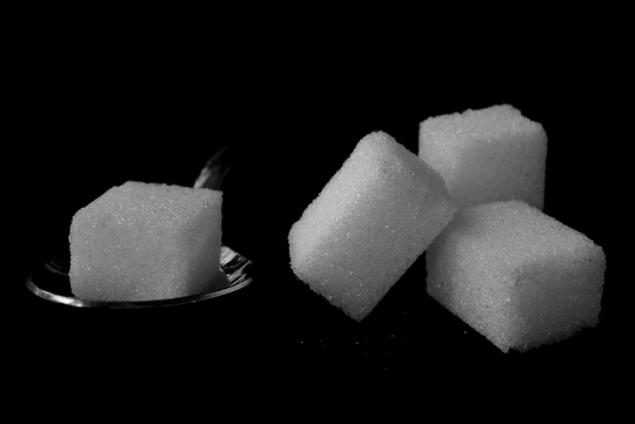249
Sugar or 50 Shades of White Death!
The harm of sugar has long been proven. White refined sugar is known to be an energy wasteland devoid of proteins, fats and nutrients and trace elements.
Sugar is harmful, it can cause more than 70 problems in our body, leads to very serious diseases, many of which are incurable and deadly.

This is what refined sugar can do:
1. It causes a decrease in immunity. Suppresses the immune system, weakening the body’s defense mechanisms against infectious diseases.
2. Violates the balance of mineral substances in the body and calls for a violation of mineral metabolism. Which can lead to chromium deficiency. The main task of chromium is to regulate blood sugar levels.
3. Causes a deficiency of the copper microelement in the body
4. It disrupts the absorption of calcium and magnesium.
5. It causes a sharp increase in the level of adrenaline, which can lead to irritability, excitement, impaired attention. In children, this is expressed by hyperactivity, anxiety, distraction and weakness.
6. May cause an increase in blood cholesterol.7 It leads to changes in glucose and insulin levels. Leads to an increase in glucose and insulin levels in women who use hormonal contraceptives.
8. Leads to drug addiction. Due to the unstable content of sugar in the blood causes rapid fatigue, frequent headaches and fatigue. This causes a constant desire to eat sweets. A serving of sweets leads to temporary relief, but after a while the feeling of hunger and the need for sweets become even more acute.
9. Sharply can cause hypoglycemia (lowering glucose levels).
10. Promotes obesity. Since a new chemical compound that is formed during heat treatment of a mixture of fat, sugar and salt (fast food) is not excreted from the body.
11. Promotes the development of caries. When sugar and bacteria in the mouth interact, an acid is formed that destroys tooth enamel. But the sugar solution itself is a rather acidic medium, which, settling on the teeth, can destroy the tooth. Conduct an experiment - place the fallen tooth in a glass of Coca-Cola, and you will clearly see that sugar is not harmless to the health of teeth.
12. Contributes to the occurrence of gum diseases, such as periodontal disease. And infections in the oral cavity can cause heart disease. This is due to the body’s response to an immune infection.
13. It causes a violation of insulin sensitivity, which can lead to diabetes and death.
14. It contributes to the development of alcoholism. And sugar itself acts like an intoxicant, such as alcohol or drugs.
15. It causes premature aging, as it accelerates the onset of age-related changes.
16. It is the cause of osteoporosis.
17. It helps to change (increase or decrease) systolic pressure.
18. It can cause the appearance of eczema in children.
19. It causes drowsiness and reduces activity in children. Especially after the hyperactivity phase.
20. Promotes the early appearance of wrinkles, as it changes the structure of collagen and reduces the elasticity of tissues.
21. It can cause pathological changes and damage to the kidneys and increase their size.
22. Increases the number of free radicals in the body
23. It can disrupt or weaken the structure of DNA, which can result in mutations.
24. May have a negative effect on the pancreas through changes in insulin production.
25. Increases the acidity of digested food.
26. Negatively affects the electrolytic composition of urine.
27. May contribute to the occurrence of cancer of the stomach, rectum, intestine, breast and ovaries. Related to the development of prostate, pancreatic, bile duct, gallbladder and lung cancer. Sugar serves as nutrition for cancer cells.
28. It leads to failures in the immune system.
29. Promotes the growth of bacteria, yeast fungi and the occurrence of fungal diseases. Violation of their balance in the body leads to frequent diseases caused by weakened immunity.
30. Violates absorption and interferes with the absorption of proteins. It can change the structure of protein and disrupt protein processes in the body.
31. It can cause headache and migraine including.
32. Reduces the elasticity of the vessels, which can lead to their damage.
33. It can reduce the elasticity of tissues and impair their function.
34. Could cause emphysema.
35. It provokes the development of atherosclerosis.
36. It causes the development of food allergies.
37. It can cause appendicitis and provoke an exacerbation of chronic appendicitis.
38. Negatively affects the functional activity of enzymes, reducing it.
39. Increases the likelihood of developing varicose veins.
40. May reduce the production of growth hormone. Causing hormonal imbalance, which can lead to an increase in estrogen (female hormone) in men.
41. Deteriorates vision, can cause the development of cataracts and myopia.
42. It causes the formation of stones in the gallbladder.
43. May cause toxicosis during pregnancy
44. Violates the process of metabolism in the body, which contributes to the development of diabetes.
45. It disrupts the normal functioning of the intestine. It can cause diseases of gastrointestinal tact and increases the likelihood of ulcerative colitis.
46. It can lead to the development of arthritis and other autoimmune diseases such as asthma and multiple sclerosis.
47. It can provoke Parkinson's disease (tremors and movement disorders).
48. Increases the risk of Alzheimer's disease (senile dementia).
49. It causes a weakening of the physiological processes of the body.
50. Reduces the body’s ability to resist bacterial infections.
51. It provokes attacks of bronchial asthma and cough.
52. Increases the risk of coronary heart disease and predisposes to the occurrence of other cardiovascular diseases.
53. It helps to reduce the level of vitamin E.
54. It can cause dizziness.
55. Too much sugar destroys proteins.
56. Increases the number of fat cells in the liver, causing liver cells to divide. This leads to an increase in liver size.
57. It causes the accumulation of fluid in the body.
58. Able to make the tendons more brittle.
59. Due to reduced attention, it weakens the ability to learn and remember information.
60. It can cause depression and depression.
61. Increases the risk of developing polio.
62. Increases the concentration of the neurotransmitter serotonin.
63. It disrupts the absorption of nutrients during digestion.
64. It makes stress worse. During stress, the body increases the amount of chemicals (stress hormones – epinephrine, cortisol and adrenaline), the task of which is to prepare the body for attack or flight. These same hormones can cause negative reactions - anxiety, quick temper, sharp mood swings.
65. It can increase the risk of developing gout.
66. Excessive sugar consumption during pregnancy can provoke the birth of an underweight baby or cause premature birth.
67. Sugar can cause dehydration in newborns.
68. It slows down adrenal function.
69. Too much sugar intake provokes epilepsy attacks.
70. In obese people, sugar increases blood pressure.
71. Reduces the level of high-density lipoproteins.
72. Leads to exacerbation of peptic ulcer disease of the stomach and duodenum.
73. Promotes the appearance of hemorrhoids.
Can you eat 16 cubes of refined sugar at a time? How about half a liter of Coke? This is the amount of dissolved sugar equivalent contained in 500 milliliters of this drink.
Look at the pictures. That is how much sugar in cubes is contained in the form of sugar substitutes in the usual drinks and sweets. Now you understand the harm of sugar, especially dissolved. Its harm is not immediately visible, as well as dissolved sugar.
It is not recommended to eat more than 1 kilogram of sugar per month (12 kilograms per year). The average consumption rate in Russia is 80 kilograms. If you think that you do not eat so much, then know that sugar is found in almost all foods - in sausage, vodka, ketchups, mayonnaise and so on.
P.S. And remember, just changing our consumption – together we change the world!
Join us on Facebook, VKontakte, Odnoklassniki
Source: ruslekar.info/Vred-sahara-bolee-70-faktorov-1028.html
Sugar is harmful, it can cause more than 70 problems in our body, leads to very serious diseases, many of which are incurable and deadly.

This is what refined sugar can do:
1. It causes a decrease in immunity. Suppresses the immune system, weakening the body’s defense mechanisms against infectious diseases.
2. Violates the balance of mineral substances in the body and calls for a violation of mineral metabolism. Which can lead to chromium deficiency. The main task of chromium is to regulate blood sugar levels.
3. Causes a deficiency of the copper microelement in the body
4. It disrupts the absorption of calcium and magnesium.
5. It causes a sharp increase in the level of adrenaline, which can lead to irritability, excitement, impaired attention. In children, this is expressed by hyperactivity, anxiety, distraction and weakness.
6. May cause an increase in blood cholesterol.7 It leads to changes in glucose and insulin levels. Leads to an increase in glucose and insulin levels in women who use hormonal contraceptives.
8. Leads to drug addiction. Due to the unstable content of sugar in the blood causes rapid fatigue, frequent headaches and fatigue. This causes a constant desire to eat sweets. A serving of sweets leads to temporary relief, but after a while the feeling of hunger and the need for sweets become even more acute.
9. Sharply can cause hypoglycemia (lowering glucose levels).
10. Promotes obesity. Since a new chemical compound that is formed during heat treatment of a mixture of fat, sugar and salt (fast food) is not excreted from the body.
11. Promotes the development of caries. When sugar and bacteria in the mouth interact, an acid is formed that destroys tooth enamel. But the sugar solution itself is a rather acidic medium, which, settling on the teeth, can destroy the tooth. Conduct an experiment - place the fallen tooth in a glass of Coca-Cola, and you will clearly see that sugar is not harmless to the health of teeth.
12. Contributes to the occurrence of gum diseases, such as periodontal disease. And infections in the oral cavity can cause heart disease. This is due to the body’s response to an immune infection.
13. It causes a violation of insulin sensitivity, which can lead to diabetes and death.
14. It contributes to the development of alcoholism. And sugar itself acts like an intoxicant, such as alcohol or drugs.
15. It causes premature aging, as it accelerates the onset of age-related changes.
16. It is the cause of osteoporosis.
17. It helps to change (increase or decrease) systolic pressure.
18. It can cause the appearance of eczema in children.
19. It causes drowsiness and reduces activity in children. Especially after the hyperactivity phase.
20. Promotes the early appearance of wrinkles, as it changes the structure of collagen and reduces the elasticity of tissues.
21. It can cause pathological changes and damage to the kidneys and increase their size.
22. Increases the number of free radicals in the body
23. It can disrupt or weaken the structure of DNA, which can result in mutations.
24. May have a negative effect on the pancreas through changes in insulin production.
25. Increases the acidity of digested food.
26. Negatively affects the electrolytic composition of urine.
27. May contribute to the occurrence of cancer of the stomach, rectum, intestine, breast and ovaries. Related to the development of prostate, pancreatic, bile duct, gallbladder and lung cancer. Sugar serves as nutrition for cancer cells.
28. It leads to failures in the immune system.
29. Promotes the growth of bacteria, yeast fungi and the occurrence of fungal diseases. Violation of their balance in the body leads to frequent diseases caused by weakened immunity.
30. Violates absorption and interferes with the absorption of proteins. It can change the structure of protein and disrupt protein processes in the body.
31. It can cause headache and migraine including.
32. Reduces the elasticity of the vessels, which can lead to their damage.
33. It can reduce the elasticity of tissues and impair their function.
34. Could cause emphysema.
35. It provokes the development of atherosclerosis.
36. It causes the development of food allergies.
37. It can cause appendicitis and provoke an exacerbation of chronic appendicitis.
38. Negatively affects the functional activity of enzymes, reducing it.
39. Increases the likelihood of developing varicose veins.
40. May reduce the production of growth hormone. Causing hormonal imbalance, which can lead to an increase in estrogen (female hormone) in men.
41. Deteriorates vision, can cause the development of cataracts and myopia.
42. It causes the formation of stones in the gallbladder.
43. May cause toxicosis during pregnancy
44. Violates the process of metabolism in the body, which contributes to the development of diabetes.
45. It disrupts the normal functioning of the intestine. It can cause diseases of gastrointestinal tact and increases the likelihood of ulcerative colitis.
46. It can lead to the development of arthritis and other autoimmune diseases such as asthma and multiple sclerosis.
47. It can provoke Parkinson's disease (tremors and movement disorders).
48. Increases the risk of Alzheimer's disease (senile dementia).
49. It causes a weakening of the physiological processes of the body.
50. Reduces the body’s ability to resist bacterial infections.
51. It provokes attacks of bronchial asthma and cough.
52. Increases the risk of coronary heart disease and predisposes to the occurrence of other cardiovascular diseases.
53. It helps to reduce the level of vitamin E.
54. It can cause dizziness.
55. Too much sugar destroys proteins.
56. Increases the number of fat cells in the liver, causing liver cells to divide. This leads to an increase in liver size.
57. It causes the accumulation of fluid in the body.
58. Able to make the tendons more brittle.
59. Due to reduced attention, it weakens the ability to learn and remember information.
60. It can cause depression and depression.
61. Increases the risk of developing polio.
62. Increases the concentration of the neurotransmitter serotonin.
63. It disrupts the absorption of nutrients during digestion.
64. It makes stress worse. During stress, the body increases the amount of chemicals (stress hormones – epinephrine, cortisol and adrenaline), the task of which is to prepare the body for attack or flight. These same hormones can cause negative reactions - anxiety, quick temper, sharp mood swings.
65. It can increase the risk of developing gout.
66. Excessive sugar consumption during pregnancy can provoke the birth of an underweight baby or cause premature birth.
67. Sugar can cause dehydration in newborns.
68. It slows down adrenal function.
69. Too much sugar intake provokes epilepsy attacks.
70. In obese people, sugar increases blood pressure.
71. Reduces the level of high-density lipoproteins.
72. Leads to exacerbation of peptic ulcer disease of the stomach and duodenum.
73. Promotes the appearance of hemorrhoids.
Can you eat 16 cubes of refined sugar at a time? How about half a liter of Coke? This is the amount of dissolved sugar equivalent contained in 500 milliliters of this drink.
Look at the pictures. That is how much sugar in cubes is contained in the form of sugar substitutes in the usual drinks and sweets. Now you understand the harm of sugar, especially dissolved. Its harm is not immediately visible, as well as dissolved sugar.
It is not recommended to eat more than 1 kilogram of sugar per month (12 kilograms per year). The average consumption rate in Russia is 80 kilograms. If you think that you do not eat so much, then know that sugar is found in almost all foods - in sausage, vodka, ketchups, mayonnaise and so on.
P.S. And remember, just changing our consumption – together we change the world!
Join us on Facebook, VKontakte, Odnoklassniki
Source: ruslekar.info/Vred-sahara-bolee-70-faktorov-1028.html
21 steps to make your home more environmentally friendly and safe for health
3 options-plan kitchen for those who love to cook + tips of the pros























